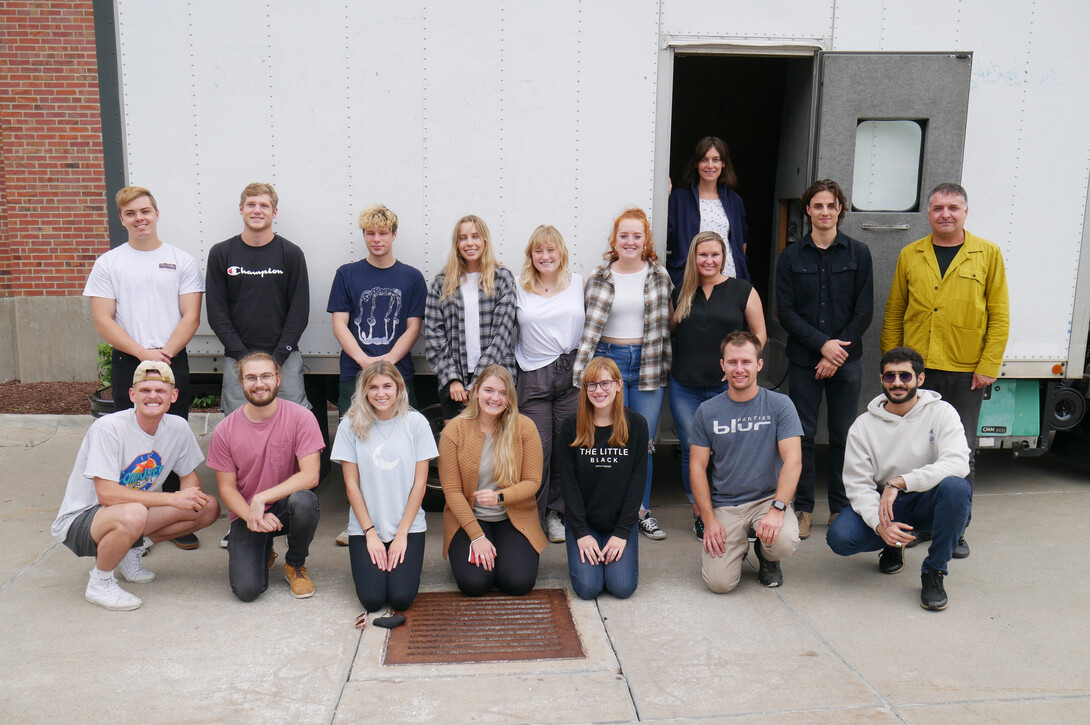
University of Nebraska–Lincoln College of Architecture students, along with a multidisciplinary collaborative of Omaha and Lincoln-based leaders in design, performance, education and placemaking, have begun planning for a mobile stage aimed at reviving neighborhoods, schools and public spaces post-pandemic.
Over the next three months, architecture students will convert the former knife-sharpening truck into a state-of-the-art stage on wheels called the Omaha Mobile Stage. Upon completion, the stage will be mobilized to provide safe access to performing arts in neighborhoods and schools throughout the Omaha metro.
“The Omaha Mobile Stage was conceived as an antidote to the cultural and social stagnation that local neighborhoods and schools have felt throughout the pandemic,” said Jessica Scheuerman, executive director of Partners for Livable Omaha, the nonprofit overseeing the project. “As human beings, we need access to beauty. As neighbors, we need access to each other. Achieving those aims in a safe and healthy environment is critical to the civic revitalization we all need right now. As the Delta variant threatens another round of stultifying shutdowns, this project is more relevant than ever.”
Partners for Livable Omaha purchased the used 18-foot truck, which was then gutted and repaired at Twins Auto in Omaha in preparation for its conversion to a stage. In August, the truck was transferred to Nebraska Innovation Studio in Lincoln.
“Access to performing arts and cultural events in general is essential for a vibrant social and intellectual life,” said Jeffrey L. Day, professor of architecture and landscape architecture at Nebraska. “This becomes even more urgent for a community suffering from long-term pandemic shutdowns and the social isolation that stems from these conditions. The FACT design-build-collaborate studio and the College of Architecture are excited to be part of this important project, and we are thrilled to kick off the work on the Omaha Mobile Stage.”
Throughout the fall semester, architecture students will design and build the truck conversion. The work will occur within the framework of the FACT (Fabrication And Construction Team) studio, under Day’s leadership.
“The choice to partner with Jeffrey Day and FACT ensures that the stage will be a local cultural amenity,” Scheuerman said.
A team of fourth-year architecture and interior design students will create the stage inside Nebraska Innovation Studio, one of the nation’s top makerspaces.
The design-build phase is led by Scheuerman, Day and Omaha-based theatrical designer and technical director Brendan Greene-Walsh.
In spring 2022, the Omaha Mobile Stage will tour neighborhoods in a series of free, live performances that cater to the local heritage, culture and tastes of Omaha’s unique communities.
Performances will be produced in partnership with a diverse range of public space managers, educators, performers and arts nonprofits. Omaha Mobile Stage’s programming provides its partners with:
• The stage in an outdoor public space or school setting • Stipends for artists, event managers and techs • Sound and lighting equipment • Promotion
“The Omaha Public Schools Foundation is elated to bring the Omaha Mobile Stage to students in our district, as well as the entire community,” said Toba Cohen-Dunning, executive director of the Omaha Public Schools Foundation. “This is a remarkable resource, especially in light of the pandemic. The arts are crucial to a child’s life. As Omaha Public Schools works to educate, enrich and enhance the lives of students, this arts endeavor could not come at a better time.”
Restrictions on access to performing arts are expected to continue for OPS students. As such, the Omaha Mobile Stage, in collaboration with local arts groups and the OPS Foundation, will deliver performing arts experiences to school grounds via its Artists Return to Schools program.
“This is an aspect of a child’s life that is often missing due to economic constraints on families,” Cohen-Dunning said. “With a district free/reduced lunch membership of 77%, we know that the investment in having the arts come to the students (instead of the opposite) opens up their worldview, providing opportunities that are often only afforded to our suburban counterparts.”
Performing arts are integral to the social, civic and economic wellbeing and vitality of Omaha. Restrictions on gatherings and severe unemployment have been devastating.
Today, artists remain among the most severely affected by the pandemic.
According to a recent report by Americans for the Arts, artists and creatives remain among the most severely affected segment of the nation’s workforce. Ninety-five percent lost creative income. At the height of the pandemic in 2020, 63% experienced unemployment. As of July 2021, 39% of U.S. nonprofit arts organizations with in-person programming remained closed to the public.
Arts organizations, schools and performers have adapted — changing the physical environment for safer in-person engagements and securing outdoor spaces. These costs contribute to the economic toll at a time when nonprofits and venues are losing revenue and experiencing declines in giving.
Lack of arts access disproportionately impacts under-served communities, where students rely on schools for arts enrichment.
Prior to the pandemic, Black and Hispanic students had less than half of the access to arts education than white peers. According to research from the National Endowment for the Arts and Americans for the Arts, low-socioeconomic=status students who are engaged in arts learning have increases in: high school academic performance; college-going rates and grades; and holding jobs with a future.
The Omaha Mobile Stage is made possible by the support of an anonymous donor, Kevin M. McCarthy, the Omaha Public Schools Foundation, Paul Scheuerman, Bluestone Development, Infinity CPA Group, Baird Holm, and Sharon and Jim Kresha.
It is a collaboration among: Partners for Livable Omaha, Actual Architecture Company, Brendan Greene-Walsh, the College of Architecture, Culxr House, the Fabrication and Construciton Team, the Gifford Park Neighborhood Association, Holy Family Community Center, Joslyn Castle, Nebraska Innovation Studio, the Nebraska Writers Collective, Omaha Conservatory of Music, Omaha Public Schools Foundation, Project Project, The RiverFront and tbd. dance collective.







